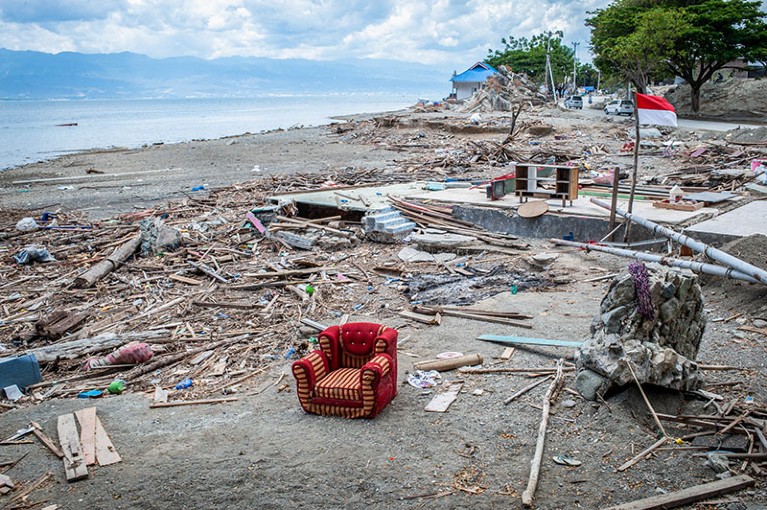Hello Nature readers, welcome to your essential daily briefing of science news.

International researchers are waiting to be granted access to study the aftermath of the tsunami. Credit: Hariandi Hafid/SOPA Images/LightRocket/Getty
Tsunami scientists clash with Indonesian government
Two weeks after an earthquake and subsequent tsunami killed more than 2,000 people on the Indonesian island of Sulawesi, some non-Indonesian scientists say that the country’s restrictions on international researchers are slowing down disaster-related work. Other say that Indonesia is right to enforce rules that put local researchers and institutions in the lead. “As long as the tsunami community exchanges ideas and information openly, it does not matter so much whether I can get in,” says tsunami researcher Philip Liu. “But there are so many different ideas and so much to do. Allowing only a few people to go in might mean that a lot of fresh evidence and information will be lost."
China awaits controversial journal blacklist
Researchers are still awaiting a national blacklist of dodgy journals, five months after the government promised to create one. Preparation of the list has been shrouded in secrecy, with mysterious selection criteria and no deadline. Some scientists say that lists of approved publications would work better, and what the country really needs is a system to evaluate research quality that goes deeper than simply where it was published.
Cash injection for diagnosis in the developing world
The Bill & Melinda Gates Foundation and the Chan Zuckerberg Initiative have announced a new programme to bring metagenomic sequencing to clinicians in the developing world. The technique can be a powerful diagnostic tool when simple tests come up empty handed, but it’s expensive and data-hungry. Clinicians will get training, a backpack-sized sequencer, a year’s worth of chemical reagents and access to an online platform to crunch through their data and compare them to databases of known microbes.
FEATURES & OPINION
What legal weed means for science
Canada has just become the second country in the world (after Uruguay) to legalize cannabis for all uses, prompting a cannabis-research boom. The government is putting up millions of dollars in funding to support everything from gene mapping and metabolic engineering to optimal drying techniques and growing practices. “You’re talking about a plant that’s a century out of date in terms of modern breeding techniques and scientific development,” says botanist Ernest Small.
The internet of animals
Biologist Martin Wikelski has a plan: within ten years, he foresees a network of satellites devoted to following hundreds of thousands of animals in real time. Earlier this year, he took the first step when his team’s antenna was installed on the International Space Station. Radio collars and GPS trackers have already changed our understanding of animal movements — for animals who can take the weight of a tracker, and researchers who can afford the cost. The tags used by the new system are so small and cheap that they will allow biologists to add small mammals, birds, bats and even insects to that list.
How to handle online harassment
Climate change, solar geoengineering, animal research — some fields are a lightning rod for harassment, especially online. Three scientists explain how they handle rude emails, Twitter trolls and serious threats — all while maintaining their mental health and a commitment to public engagement.
